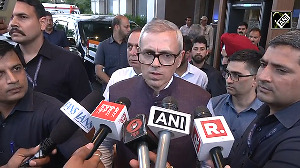The inevitable has finally happened. The housing bubble in the US has burst. And the sub-prime crisis that resulted from the real estate bust in the US destroyed investor wealth worth trillions of dollars across the world.
The bust has claimed high profile investment banks like Bear Sterns (taken over by J P Morgan with dollops of help from the US Federal reserve, the US equivalent of Reserve Bank of India), Lehman Brothers (filed for bankruptcy on September 15 leading to the global turmoil since then) and, one of the most venerable insurers in the world, the American International Group (taken over by the US government for about $85 billion).
Today, the US government led by Treasury Secretary (US equivalent of India's finance minister) Henry Paulson (himself an ex-Goldman Sachs CEO, another investment bank facing the music) is planning to make provisions for an $800 bailout package that would buy all the bad loans and related products sold by US commercial and investment banks. This arrangement, it is believed, will help the current credit crisis blow over without damaging the confidence of banks, financial institutions and ordinary people like you and me in the US.
Read these features?
Vote! Worst-dressed Indian celebs
Shilpa Shetty sashays
CAT 2008: Section-wise tips for you!
And since most of the US companies do business in India and with companies in India and the world over, the bailout will help restore the global confidence in financial systems like commercial and investment banks.
However, for the next two years the whole world, including India, is expected to reel under the effect of the current financial crisis considered as the worst since the Great Depression of 1929.
This is how it will affect us in India.
1. Slowdown in jobs
Companies like Lehman Brothers, Merrill Lynch, AIG and Morgan Stanley, to name a few, have their captive research units, brokerage arms, investment banking arms in India employing several hundred thousand people in what is popularly known as BPOs (Business Process Outsourcing) and KPOs (Knowledge Process Outsourcing).
Lehman Brothers' Powai unit itself employed about 2,200 people most of whom will be rendered unemployed unless some other company buys out Lehman's India operations and keeps the wheels running.
Now that the above-mentioned companies are finding it difficult to run their businesses in the US they have either sold out to other companies (Bank of America taking over Merrill Lynch) or to the US government (AIG buyout by the US government).
Obviously, to maintain profits or to just cut even in the current scenario they will start downsizing their workforce wherever they can.
Also, most of these American banking companies have outsourced their technology-related jobs to Indian companies like Satyam Computers, TCS, Infosys etc which might be affected in the near future. The Indian companies, however, maintain that it is an opportunity for them to expand as, in a bid to reduce costs, many US banks will outsource more work to India.
Sectors like real estate, aviation, information technology have already started downsizing their employee strength. There are newspaper reports about DLF (because of the cash crunch) and Kingfisher (rise in aviation oil price and lesser number of flyers taking to the skies) reducing their staff strength by 300.
Technology companies like TCS and IBM had removed more than 500 people each citing poor performance long before the Lehman Brother winds swept across India.
2. Increase in loan rates
First it was the inflation rate that spoiled the party for Indian borrowers of home loans, personal loans and credit card purchases. Now taking a cue from the US banks -- which today are so wary that they are not even lending to each other for the fear that they may not get their money back -- Indian banks too have decided to thoroughly scrutinise the repayment capacity of Indian borrowers lest they too go the Lehman Brothers way.
As their cost of money goes up banks will pass on this increase to their customers, ie, borrowers like you and me, at a higher rate of interest. If banks feel that borrowers may not return their money they are going to price it higher to cover the risk of a few defaulting on their payments.
The confidence that borrowers will repay the banks' money with interest every month -- at least in the US -- is shattered and Indian borrowers will have to bear the brunt of this lack of confidence in the days to come.
Bottomline: Gear up to pay more interest on your loans.
3. Correction in real estate prices
There is some good news, though. If experts are to be believed real estate prices in Indian towns and cities are likely to come down by 10-15 per cent in the next few months.
The reason given is most US companies that had bought stakes in Indian real estate companies are facing a cash crunch. Others who had promised to invest in Indian real estate will not do so for the simple reason that the US is no more the place where you can get dollars easily and at a cheaper rate.
Most real estate developers who depend on this flow of money may find it difficult to complete their projects. Also, buyers too have dried up because of unaffordably high real estate and interest rates.
The outcome could be real estate developers lowering rates to lure buyers.
4. Increase in gold prices
Because of the financial problems in the US global investors are losing their faith in the supremacy of the US dollar as a store of value. As a result they are selling dollars to buy some other currency, say the euro or the Japanese yen.
Whenever such an event happens investors flock to that ultimate store of value called gold or the noble metal. As the festival season starts with Navratri in India more and more people will demand gold thereby increasing its price further.
However, an increase beyond a particular point is likely to tell on the demand for gold. Just like it is happening with the real estate scene in India.
5. More inflation
Increase in oil prices -- it jumped a whopping $30 a barrel in intra-day trade today before settling at $108-109 to a barrel -- and weakening of the Indian rupee against the dollar will act as a double whammy for Indians.
Crude prices have a multiplier effect. As most goods transported in India use some or the other form of energy it increases the cost of transportation and hence an increase in the price of vegetables, pulses etc.
As the Indian rupee weakens against the dollar -- more foreign companies are selling rupees to buy US dollars to take them back to their country -- it increases our import bills. For every dollar for which we paid Rs 39 only a few months back, we will have to pay a good Rs 45.
In this scenario it is small consolation that oil prices have come down from their $140 plus to a barrel at near about $100 to a barrel.
Also, if inflation rises further, expect the Reserve Bank of India to further increase your borrowing costs.
6. Speed breaker ahead
Future Group Chairman Kishore Biyani had, way back in 2007, said that 2009 will be a crucial year for the world economy as a whole and particularly India. How very prophetic his words sound today.
With the US economy firmly in the grip of a slowdown owing to the housing price collapse and the subsequent sub-prime drama, this slowdown is fast snowballing across global boundaries and more so India as we depend a lot on the US for the money they bring in.
As the US funds tap is expected to run dry in the next 6-12 months Indian companies will be starved of the much-needed cash to expand their businesses. An impact is already visible in the real estate sector as developers scour the world in search of cheap money.
If this slowdown impacts the investment climate in India then we can no more dream of the 7.5-8 per cent growth rate that was once upon a time considered a given. A slowdown will force more companies to enter the cost-cutting arena leading to a sizeable dip in job creation.
7. Rollercoaster ride
Be prepared to ride the ups and downs of the global financial markets as India is no more an isolated island. India is likely to follow whatever happens in the US, European or Asian stock markets.
A case in point is how the Sensex closely traced the ups and downs of the Dow Jones and Nasdaq in the previous week.
The same is true of the prices of oil, gold, aluminium, copper steel and any other commodity. Gone are the days when markets defied Newton and gravity. Nobody can expect the markets to move only in one direction.
If you are a trader in such a market, then not even God can save you.







 © 2025
© 2025